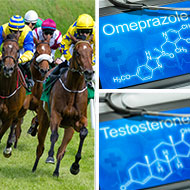
Product found to contain low levels of testosterone
Injectable Omeprazole should not be used in racehorses due to the presence of testosterone, the British Horseracing Authority (BHA) has advised.
BHA encouraged trainers to discuss alternative treatments with their veterinary surgeons.
Analytical laboratory LGC looked at a number of products containing Omeprazole. Samples of the injectable Omeprazole 100mg/ml (BOVA UK) were found to contain low levels of testosterone.
No oral preparations were found to contain testosterone or any other anabolic steroid.
BHA warned that the possession, use or attempted use of this product could amount to a breach of the Rules of Racing.
Presence of testosterone over the permitted threshold in a sample could result in a 14-month suspension from racing and a 12-month stand down from racing for the horse, as well as other penalties for the Responsible Person.
Trainers and other industry participants were advised to remove the product from all licensed premises and not to administer the product to a thoroughbred from birth until permanent retirement from racing.



 The RCVS has announced a new version of its 1CPD mobile app, with enhanced features for veterinary surgeons and veterinary nurses to record their continuing professional development.
The RCVS has announced a new version of its 1CPD mobile app, with enhanced features for veterinary surgeons and veterinary nurses to record their continuing professional development.